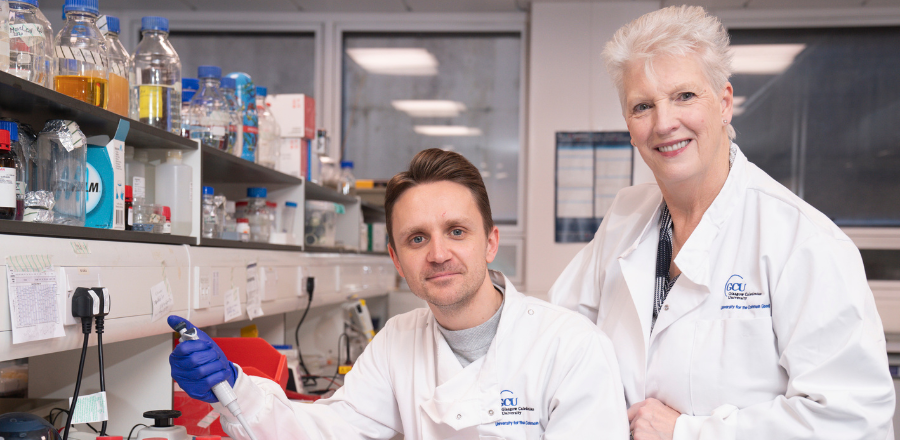Charity boost for University blood cancer research

A Glasgow mum who set up a charity during her breast cancer battle has donated £7,000 to Glasgow Caledonian University, to boost research into finding new targeted treatments for Acute Myeloid Leukaemia (AML) and Multiple Myeloma (MM).
Eileen Hogg, 64, founded White Feather Charitable Aid in 2013 while receiving treatment for Stage 3 breast cancer. She realised that little luxuries can make a big difference to those living with cancer.
She met blood cancer researcher Dr Mark Williams through his lawyer wife Lindsay’s late grandfather William Downie and mum Ann Gaughan, who donated to the charity through events at the Wellcroft Bowling Club in Glasgow when Mr Downie was Club President.
Eileen was blown away by Dr Williams’ passion, commitment and determination into finding new blood cancer treatments that she held two fundraising events this year to help support the purchase of crucial lab supplies, such as reagents for carrying out research studies using advanced cell culture and flow cytometry.
She handed over the cheque to Dr William’s Research Group during a visit to the University’s Biological and Biomedical Science labs in the School of Health and Life Sciences.
So far, Eileen and her team of two – her daughter Laura Hogg and friend Cathie Reilly – at the White Feather Charitable Aid have donated more than £100,000 to help improve the lives of cancer patients.
Eileen said: “The great thing about donating funds to Mark and his research group is that I know exactly where the funds are going and who it’s going to benefit from it.
“This is all very close to my heart as I’m a cancer survivor and I have close friends who have suffered from blood cancers.
“Mark is so passionate and committed to his research he makes you want to help. I think the research going on at the University is fantastic. Glasgow Caledonian University is an excellent institution that really looks after its students and Mark is helping to support, nurture and promote researchers of the future.
“I wish we could have raised more funds for The Williams Research Group, but we will do something further down the line for sure. Hopefully this story will encourage others to donate to this great cause.”
The money was raised during a fundraiser at the Wellcroft Bowling Club in July and a charity ball at the Crossbasket Castle Hotel last month, attended by Dr Williams, his research team and family and friends.
Dr Williams, Lecturer in Cancer Biology and Research Centre for Health (ReaCH) Molecular Mechanisms of Long-term Conditions Research Group lead, said: “I cannot thank Eileen enough for her incredible generosity. She is an amazing woman and a cancer survivor who has gone above and beyond to raise these funds for my labs research. I’m thrilled that this local charity really values the work that we do here at Glasgow Caledonian University.”
According to Cancer Research UK, there are around 2,600 AML deaths and 3,100 MM deaths in the UK every year. Dr Williams is focusing on macrophage-driven therapy resistance and finding new therapies.
Macrophages are large white blood cells that are an integral part of the immune system. Their job is to locate and destroy disease causing organisms and also to kills cancer cells. However, through factors released by cancer cells and also cancer cell-to-macrophage contact, macrophages can be re-educated by cancer cells to become cancer supporting and drive therapy resistance.
Dr Williams works closely with world-leading local and international AML and MM experts, in particular Dr Monica Guzman, who is based at Weill Cornell University in New York.
Mark and his team have received hands-on-training in Dr Guzman’s Lab in cutting-edge techniques such as the advanced culture of primary cells from AML patients, techniques that are now established in Dr Williams’ lab.
The long-term aim of his group’s research is to enhance clinical outcomes in blood cancer patients through the development of new, safe and effective targeted therapies for blood cancer patients.
